Sports
/ArcaMax

Dan Wiederer: The Ben Johnson-Ryan Poles union sparks optimism -- but Bears' heavy lifting has just begun
INDIANAPOLIS — Time will tell.
The early feedback on the mushrooming bond between Chicago Bears general manager Ryan Poles and coach Ben Johnson is positive. Poles is convinced he barreled up this latest big swing on reviving the team, and Johnson has injected Halas Hall with a booster shot of energy over the past month.
Poles is most ...Read more
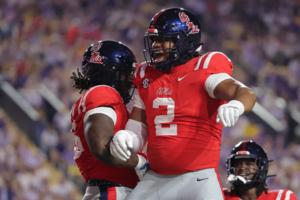
Dieter Kurtenbach: 49ers mock draft -- Walter Nolen is exactly what the Niners need
The Philadelphia Eagles won the Super Bowl for various reasons, one of which was that they drafted exceptionally well.
And for a few seasons, it seemed as if they took Georgia players nearly every pick.
It’s a smart pipeline — UGA was the dominant force in college football then, and no one put together a better defense than Kirby Smart.
...Read more
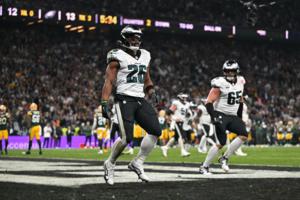
Marcus Hayes: Top 5 Saquon Barkley moments from the Eagles' Super Bowl season
PHILADELPHIA — It’s a time-worn Philadelphia tradition: fretting over the future rather than relishing the moment.
As the city wrings its hands over the fate of its latest Super Bowl champion, few seem to appreciate that, less than three weeks ago, the best season any Eagles team ever had ended with a blowout win in Super Bowl LIX over Andy...Read more
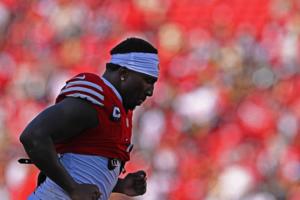
49ers grant Deebo Samuel's wish, agree to trade receiver to Commanders for a draft pick
Deebo Samuel produced the 11th-most receiving yards in San Francisco 49ers history over six seasons, not to mention eye-opening chunks as a tackle-breaking rusher whose dual talents often came through in the clutch.
Rather than return for a seventh season and his final one under contract, Samuel is getting traded to the Washington Commanders ...Read more
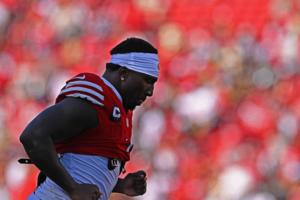
49ers reportedly agree to trade Deebo Samuel to Commanders
The San Francisco 49ers didn’t waste any time satisfying Deebo Samuel’s request for a trade, reportedly agreeing on Saturday to send the star receiver to the Washington Commanders for a fifth-round draft pick.
ESPN’s Adam Schefter was the first to report the agreement.
Wednesday during at the NFL scouting combine in Indianapolis, 49ers ...Read more
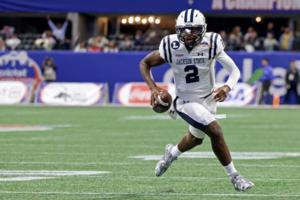
Troy Renck: CU Buffs star Shedeur Sanders must persuade NFL GMs to choose brain over brawn
INDIANAPOLIS — Shedeur Sanders aced his 13-minute media session and signed off.
“Thank you. Legendary.”
When it comes to the draft, there is a growing buzz at the NFL combine that general managers will respond, “No thank you. Ordinary.”
Before CU fanboys sharpen horns and yell Miss Peggy’s name in vain, understand this has nothing...Read more
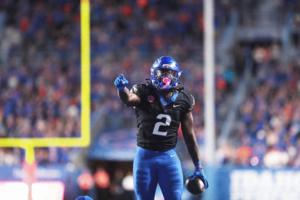
2025 NFL Draft big board: Top 50 prospects from someone with a history of being right
SAN DIEGO — Looking forward to the 2025 NFL Draft? Here’s a breakdown of the top 100 draft-eligible players ahead of the Scouting Combine
With the NFL season in our rear view, I’ve had more time to study tape and I’ve monitored how prospects adjusted to pro-style environments across various college all-star games and practices.
Front ...Read more
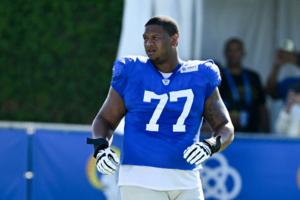
Offensive tackle Alaric Jackson agrees to 3-year extension with Rams
LOS ANGELES — A few hours after they announced that quarterback Matthew Stafford would return, the Rams agreed to terms with left tackle Alaric Jackson on a three-year contract, a person with knowledge of the situation said Friday.
The person requested anonymity because the deal has not been completed.
Jackson, who signed with the Rams as an...Read more
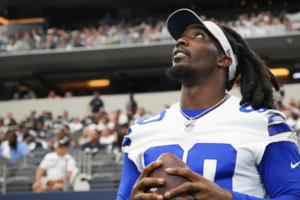
Mac Engel: Defensive end DeMarcus Lawrence gets honest about his potential return to Dallas Cowboys
FORT WORTH, Texas — Dallas Cowboys defensive end DeMarcus Lawrence made it clear late in the 2024 season he wants to, and will, play in 2025, and he would prefer it to be with the only NFL team he’s ever known.
“What’s changed?” he asked on Thursday afternoon.
Other than nearly the entire coaching staff ...
On Thursday at a ...Read more
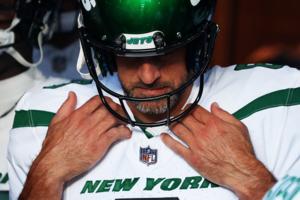
Aaron Rodgers among QB options for Giants with Matthew Stafford returning to Rams
NEW YORK — With the first quarterback domino falling in the offseason, teams are beginning to adjust accordingly.
Aaron Rodgers is now one of several veteran options the New York Giants are interested in, NFL Network Insider Ian Rapoport reported Friday.
Rodgers is still on the New York Jets roster, but the organization announced on Feb. 13 ...Read more

Chiefs' chaplain shares inspiring message about team in response to Super Bowl loss
KANSAS CITY, Mo. — Many fans and media members focused on how the Chiefs missed a chance at making NFL history when their Super Bowl three-peat came up short.
But here’s the thing: The Chiefs did make NFL history this past season. They were the only back-to-back champion to make it back to the Super Bowl for a third straight season.
The 40...Read more
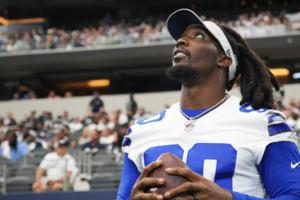
Defensive end DeMarcus Lawrence gets honest about his potential return to Dallas Cowboys
FORT WORTH, Texas — Dallas Cowboys defensive end DeMarcus Lawrence made it clear late in the 2024 season he wants to, and will, play in 2025, and he would prefer it to be with the only NFL team he’s ever known.
“What’s changed?” he asked on Thursday afternoon.
Other than nearly the entire coaching staff ...
On Thursday at a ...Read more

Matthew Stafford isn't going anywhere: QB agrees to restructured Rams contract
LOS ANGELES — Matthew Stafford is a master at leading comebacks.
And, after much offseason uncertainty, the Rams’ star quarterback is staying with the team he led to a Super Bowl title and three playoff appearances in four years.
On Friday, the Rams announced that Stafford agreed to terms on a restructured contract. Terms of his adjusted ...Read more
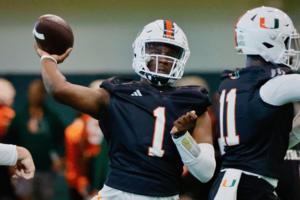
Shedeur Sanders, Cam Ward claim top status as top quarterback prospect for NFL draft
INDIANAPOLIS — Shedeur Sanders, a standout at Jackson State and Colorado, and Cam Ward, a former “no star” recruit, are considered the top two quarterbacks at the NFL Scouting Combine.
Sanders is a son of former Falcons and Braves great Deion “Prime Time” Sanders. Ward’s only scholarship offer after high school in West Columbia, ...Read more
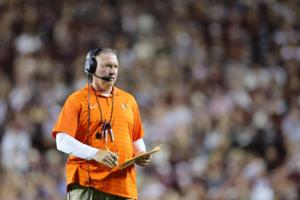
Eagles hire Bowling Green's Scot Loeffler as quarterbacks coach
PHILADELPHIA — Scot Loeffler, the longtime Bowling Green State head coach, is set to become the next Eagles quarterbacks coach, the school announced on Friday.
The 50-year-old Loeffler spent the last six seasons at Bowling Green, his first head coaching gig at the collegiate level. He has spent the bulk of his 28-year coaching career focusing...Read more
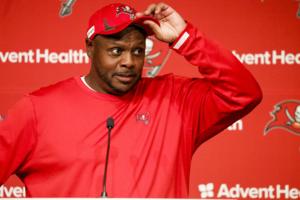
Lions got 'one of us' in new defensive line coach Kacy Rodgers
INDIANAPOLIS — Losing Terrell Williams, who Detroit Lions head coach Dan Campbell routinely called the best defensive line coach in the league, wasn't ideal.
But his replacement, if the numbers are any indication, isn't too shabby, either.
The Lions announced Kacy Rodgers as their new defensive line coach and run-game coordinator this month....Read more
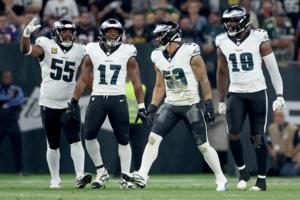
What the NFL's record $279.2 million salary cap means for the Eagles
The NFL salary cap is on the rise once again.
According to a memo issued by the league to teams on Thursday, the 2025 salary cap has been set at $279.2 million. That figure is a $23.8 million increase (9.32%) from last year’s $255.4 leaguewide, unadjusted limit, making it the third-greatest year-over-year jump by dollar amount since the ...Read more
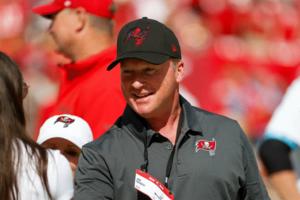
Jon Gruden is returning to the Bucs' Ring of Honor
TAMPA, Fla. — Jon Gruden was vacationing in the Great Smoky Mountains on Thursday when he learned that his name was going to be elevated to rare but familiar heights at Raymond James Stadium.
The Bucs announced that Gruden, their Super Bowl 37-winning head coach, was returning to the team’s Ring of Honor four years after his name was ...Read more

Pat McAfee says Travis Kelce confirmed he will return to KC Chiefs for 2025 season
Tight end Travis Kelce is definitely returning to the Chiefs. Well, so says ESPN’s Pat McAfee.
Days after the Super Bowl LIX loss to the Eagles, Kelce had said he would take some time to ponder whether to retire or play the last season on his contract.
Chiefs general manager Brett Veach said at the NFL Combine that he expects Kelce to be ...Read more
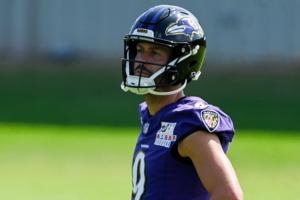
Ravens' Justin Tucker expresses empathy for accusers in new statement denying allegations
In a new statement denying allegations of inappropriate behavior at Baltimore-area massage parlors, Ravens kicker Justin Tucker said he’s devastated that “anyone I have worked with would not have felt respected and valued as a professional, but more importantly as a person.”
“To anyone who has felt otherwise, I am sorry,” Tucker ...Read more
Popular Stories
- Dan Wiederer: The Ben Johnson-Ryan Poles union sparks optimism -- but Bears' heavy lifting has just begun
- 49ers' Lynch: Purdy contract talks underway, Samuel's trade request 'makes sense'
- Dieter Kurtenbach: 49ers mock draft -- Walter Nolen is exactly what the Niners need
- Mike Sielski: The NFL should tell all the crybabies complaining about the Eagles' Tush Push to pipe down
- Jason Mackey: You expected to see changes with Steelers this offseason? Sorry about that.





